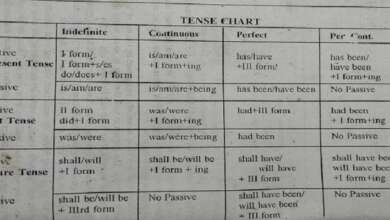Present Perfect Tense in English (Rules, Examples, Formula) PDF
Present Perfect Tense
Present Perfect Tense with Rules, Formula & Examples (Download PDF) – Present Perfect tense shows that the action is done or finished at present. It just now. To understand this, we have given all types of examples like WH questions, affirmative, negative, and interrogative sentences with rules and examples, so that you can easily understand it. How to make sentences for Present Perfect tense, what its rules, and examples, and how to use them while making the sentence, so let’s start.
First of all, we understand the basic rules and formulas.
Formula –
- Affirmative – Sub + has/have + 3rd form of verb (v3) + Obj.
- Negative – Sub + has/have not + 3rd form of verb (v3) + Obj.
- Interrogative – Has/have + Sub + 3rd form of verb (v3) + Obj.
- WH Questions – WH + Has/have + Sub + 3rd form of verb (v3) + Obj.
1. Affirmative Present Perfect Tense
Read the rules carefully given below:
- In this tense has and have are used as helping verbs and with them ‘3rd form of the main verb’ is used.
- When the subject is he, she, it, or some singular number, we use has + 3rd form of the main verb.
- When the subject is I, you, we, they, or some plural number, we use have + 3rd form of the main verb.
The formula for Affirmative sentences.
Sub + has/have + 3rd form of verb (v3) + Obj.
We have given below 15 examples of Affirmative sentences for Present Perfect Tense so that you can easily understand them.
Examples –
- Ram has taken tea.
- They have sung a song.
- I have stood first in the class.
- I have sold my bicycle.
- The sun has risen.
- He has learned his lesson.
- I have taken my meals.
- We have sold this sum.
- I have learned how to swim.
- The patient has recovered.
- I have told him the whole story.
- Somebody has stolen my pen.
- Our team has won the match.
- Someone has picked my pocket.
- We have written our compositions.
2. Negative Present Perfect Tense
Read the rules carefully given below:
- In the present perfect tense (negative sentences), not is put between has/have and 3rd form of the main verb is used.
- When the subject is he, she, it, or some singular number, we use has not + 3rd form of the main verb.
- When the subject is I, you, we, they, or some plural number, we use have not + 3rd form of the main verb.
The formula for Negative sentences.
Sub + has/have not + 3rd form of verb (v3) + Obj.
We have given below 15 examples of negative sentences for Present Perfect Tense so that you can easily understand them.
Examples –
- Ram has not taken tea.
- They have not sung a song.
- I have not stood first in the class.
- I have not sold my bicycle.
- The sun has not risen.
- He has not learned his lesson.
- I have not taken my meals.
- We have not sold this sum.
- I have not learned how to swim.
- The patient has not recovered.
- I have not told him the whole story.
- Somebody has not stolen my pen.
- Our team has not won the match.
- Someone has not picked my pocket.
- We have not written our compositions.
3. Present Perfect Tense Interrogative Sentences – Interro Negative Sentences
Read the rules carefully given below:
- In present Perfect tense/interrogative sentences. The helping verb has or have is placed before the subject, and after the subject’s 3rd form of the verb is used, and a question mark (?) is put at the end of the sentence.
- In Interro-negative sentences – first comes has or have and then the subject, after the Not, and then the 3rd form of the main verb is used.
The formula for interrogative sentences.
Has/have + Sub + 3rd form of verb (v3) + Obj
We have given below 15 examples of interrogative sentences for Present Perfect Tense so that you can easily understand them.
Examples –
- Has Ram taken tea?
- Have they sung a song?
- Have I not stood first in the class?
- Have I sold my bicycle?
- Has the sun risen?
- Has he not learned his lesson?
- Have I taken my meals?
- Have we not sold this sum?
- Have I learned how to swim?
- Has the patient not recovered?
- Have I told him the whole story?
- Has somebody stolen my pen?
- Has our team not won the match?
- Has someone picked my pocket?
- Have we written our compositions?
4. WH-Questions in Present Perfect Tense
- WH – There are sentences whose answer requires more information. WH – are related, why, where, how many, how, who, how many, when.
- To form a WH-question, start with the WH-word, and then add has or have then Subject followed by the base form of the verb, and only then add the rest of the sentence.
The formula for WH-Questions.
WH + Has/have + Sub + 3rd form of verb (v3) + Obj.
We have given below 5 examples of WH-Questions sentences for Present Perfect Tense so that you can easily understand them.
Examples –
- When have you gone there?
- Why has Ram always played cricket?
- How much have you spent?
- How have you done that?
- Why have I done this?
Download PDF – Click Here
All these Present Perfect Tenses will help you to understand how to make sentences and when and where to use these kinds of tenses.
Read also –
- All Tenses Chart with Rules and Examples
- Present Indefinite Tenses with Examples
- Present Continuous Tense with Examples




